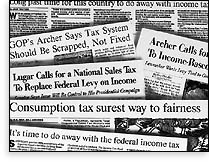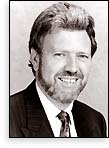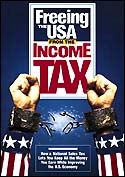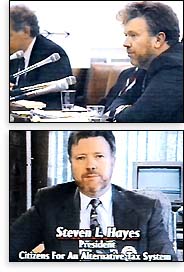

Steven L. Hayes,
President, Citizens
for an Alternative
Tax System

| ||
 |
 |


ince 1991, Steven L. Hayes has been President of Citizens for an Alternative Tax System (CATS), advocates of replacing the personal income tax with a national sales tax (NST). He has practiced law for 16 years and is currently in private practice in Los Angeles, California.
Freedom first reported on the national sales tax (NST) concept in 1989, and in 1990 was the first national publication to cover CATS.
Hayes has been interviewed on radio, television and in print media and lectured extensively throughout the country on the national sales tax and its potential for unleashing productivity and economic vigor in America. Hayes was a featured speaker in 1994 at a tax symposium on Capitol Hill covered live on C-SPAN. On June 8, 1995, he testified at congressional hearings on replacing the income tax and also served as a panelist at additional hearings held by Congress. CATS’ proposal for a national retail sales tax received very strong support. Legislators who endorsed the NST reported that, immediately after the hearings, they received floods of mail and phone calls at their offices supporting their position.
Recently, when Parade magazine asked for reader responses about the national sales tax, more than 40,000 letters came in — and over 98 percent supported the proposal. With the 1996 presidential elections drawing closer, and the NST figuring into many current and forming campaigns, CATS has become the focus of ever-increasing interest.
Hayes spoke with Freedom Editor Aron C. Mason in Los Angeles to answer questions about the NST proposal and its benefits.

|
| The National Sales Tax is a retail sales tax where only consumption is taxed – not income, not production, not any other step between manufacturing and consumption. You are only taxed when you spend money, when you buy something. |
Freedom: What is the national sales tax proposed by Citizens for an Alternative Tax System, and why do you advocate this system?
Hayes: The NST is a retail sales tax where only consumption is taxed — not income, not production, not any other step between manufacturing and consumption. You are only taxed when you spend money, when you buy something. Because there would be no income tax, you would receive more money in your paycheck and then you could determine how much tax you pay by determining how much money you spend, and then you, not the government, could determine how much tax you pay by determining how much money you spend.
Freedom: What sales tax percentage are you proposing and how did you calculate it?
Hayes: An 18 percent retail sales tax assessed at the point of purchase will collect the same $621.6 billion collected through personal and corporate income tax in 1993.
Freedom: If the same amount is collected through sales tax as through income tax, why a sales tax?
Hayes: The cost — to the taxpayer, of course — of collecting income tax is astronomical. The bureaucracy required to collect the income tax costs no less than $250 billion for 115,000 IRS employees who process 110 million returns.
With the national sales tax, you suddenly have in the ballpark of only 17 million tax returns, primarily from the retail sales people, who are already collecting sales tax in the states where it exists. It’s just “fill in how much you sold, how much money you took in, and the percentage of that.” That is what your tax is, and only the retail sales outlet files and pays, just as they do now. Ninety percent of Americans — those who are not retailers — will have no returns to file. Their tax bill is paid in full each time they purchase something.
For the individual and for businesses, the costs and the complexity vanish. Expenses, deductions, receipts, tax brackets — all of that just disappears from our lives.

| ||
 |
Hayes has been interviewed on radio, television and in print media and lectured extensively throughout the country on the national sales tax and its potential for unleashing productivity and economic vigor in America. |  |
Freedom: How would the NST affect the judicial system?
Hayes: Under the current system, the time, money and resources devoured through tax disputes clogging the courts are almost unbelievable.
Legal actions are filed to enforce tax collection, to get determinations on exemptions and on and on and on. Many attorneys in the IRS and in the Department of Justice are dedicated solely to tax matters, and they handle an amazing volume of cases concerning tax collection and enforcement. The NST would greatly reduce all of that. The only legal cases I would expect to see would be cases against merchants who didn’t turn over the sales tax collected. Any such case would be easy to resolve, compared to what the tax attorneys are used to: calculate 18 percent of the total retail sales for the person or company involved and that should be the tax. If less was paid, that’s all there is to it.
Freedom: Are there other advantages?
Hayes: Let’s look just at the privacy issue. The income tax as it is presently administered necessitates intrusion into our private lives and finances. The tax collector is often compelled to come and ask about our lifestyles, our families, anything. “Why did you pay this check?” “What was this for?” and so on.
Freedom: Could you give an example of how the NST would compare to the present income tax on an individual purchase?
Hayes: If you go out and you buy a $10,000 car, you are saddled with income tax on the money you made and sales tax on the purchase. You have to make $13,000 or $15,000 to pay your income taxes and net $10,000 to buy the car, and then pay another $700 or $800 in sales tax on the car.
With the retail sales tax, you pay $10,000 for the car plus 18 percent sales tax. You pay a total of $1,800 extra. It is simple, it is clear, you know exactly how much you pay for the car and for the taxes. With the money you now have in your pocket that you did not have to pay in personal income tax, you can buy something else or save it or invest it. You would have the choice. In the present system, you do not have any choice.
Freedom: You have said that a consumption tax would create jobs and stimulate economic growth. How so?
Hayes: I believe that we will see the greatest economic boom in our history. Because you are only taxed on what you spend, savings and investment will soar. The U.S. will become a “sponge” for capital from around the world as people seek to invest their money in the country with the best economy, the biggest market and a retail sales tax. This dramatic increase in savings and investment will cause an interest rate reduction of between two and three percent. This will mean that the interest rates for home purchases, cars and other financed items will cost hundreds of dollars less per month. Imagine home mortgage loans at five percent.
Now what happens when we save? The bank we save it in will lend it out, and when the amount of available loan money increases, the cost of borrowing goes down. The person who wants to buy a new car finds that instead of having to pay 12 percent for a car loan he gets it for 6 percent. This means his payments are 30 percent less and he can afford the car that today he can’t buy.
And what about the guy who works for the factory that makes the car? Well, when he has more work to do, he gets overtime pay. And maybe he will save some of that money and some of it goes back into the economy. The entrepreneur who is starting a business down the road and needs a new truck can get it at less cost, so he has more money to invest. And so the economy grows and expands.
Freedom: How would we make the transition from our existing tax scene to the NST?
Hayes: The changeover needs to be made all at one time. Congress and the President need to declare that “on January 1, 1996, we are going to have a retail sales tax.” Period. But then it’s done, it’s in effect and working.
Then there is the matter of how it is administered. I advocate doing it through the states; some in Washington want it done in a national office there. Either way, you just implement it.
Freedom: What is the advantage to administering it through the states?
Hayes: In 45 of 50 states and the District of Columbia, sales tax legislation is already in place, and most of the states have had systems in place for 60 years or more. In California, for example, the sales tax laws fit in a book about half the size of an average novel.
The Internal Revenue Code, on the other hand, is a multi-volume set, 1,500 pages long, and an additional 10,000 pages of regulations and rulings and 100,000 pages of court interpretations. It’s just an incredible mass of data. I say, let’s administer the sales tax through the states.

|
||
 |
Rep. Bill Archer |  |
| On June 6-8, 1995, Congressman Bill Archer held hearings in Washington on replacing the income tax. Hayes was joined by author Charles Adams, Senator Richard Lugar and Congressmen Dan Schaefer and Bill Tauzin in providing testimony in favor of the National Sales Tax. | ||
Freedom: What will be the effect on the federal bureaucracy when the NST goes into effect?
Hayes: This will naturally eliminate a massive amount of bureaucracy, but solutions exist for that, too. For example, some revenue personnel will be required to process the returns which are sent in by retailers, spot-checking to ensure that retailers are correctly filing and paying.
Freedom: What will other IRS employees do if their jobs are eliminated?
Hayes: One of the best ideas I’ve heard is to transfer many of the IRS workers not needed there over to the Drug Enforcement Administration. Major drug dealers are scared to death of people who can follow money trails, and IRS people do know how to follow money. So we can transfer them over to the area where they can go after real criminals and do something constructive for the country.
Freedom: What is the view in Washington today of the NST?
Hayes: Acceptance for NST is very broad and bipartisan and has strong support among key Congressional leaders. Bill Archer, chairman of the House Ways and Means Committee, announced right after the elections that he wants “to tear the income tax out by the roots and throw it on the side of the road.” In fact, on CNN he said he wants to repeal the 16th Amendment, which had cleared the way for personal income tax in the first place. He has also said that he thinks the income tax will be gone by the year 2000.
On this past June 6-8, Congressman Archer held hearings in Washington on replacing the income tax. I provided oral and written testimony advocating replacing the income tax with the NST, and I was joined by many others including author Charles Adams, Senator Richard Lugar of Indiana, Congressman Dan Schaefer of Colorado and Congressman Bill Tauzin of Louisiana.
Congressmen Schaefer and Tauzin — a Republican and a Democrat, respectively — are preparing NST legislation that they hope to introduce this fall.
Probably the most notable recent development is seeing the NST issue make its way into the 1996 presidential campaigns. Senator Lugar has made the NST the cornerstone of his campaign and says that enactment of the NST will be his first priority if he is inaugurated. Allan Keyes is another presidential candidate who has endorsed the NST.
Freedom: What do you tell people when they ask you what they can do to get the NST implemented?
Hayes: They should contact their representatives in government and let them know how they feel and why. I also encourage them to call their local radio talk show host about this issue and get others interested in doing so, too.
Freedom: Why did you take on this task?
Hayes: Citizens for an Alternative Tax System is an all-volunteer, grass-roots movement. Vic Krohn, our National Chairman in Washington, Brendan Haggerty, our National Campaign Director, my wife Paula and many others work with us around the country to get the word out and help those who want to know more.
All of us are working to free our country from the income tax and give our citizens and future generations an opportunity to have a better life. Our interest is in a better way for the government to gain the funding it needs, which is also better for the taxpayer. Millions of people support the NST. More and more legislators agree that there is a real opportunity to enact the NST as early as next summer. However, we must let our legislators know that we will not tolerate anything but the elimination of the income tax and replacement with a national sales tax.
For more information on the National Sales Tax, contact Citizens for an Alternative Tax System at (800) 767-7577 (or bihaggerty@aol.com).

